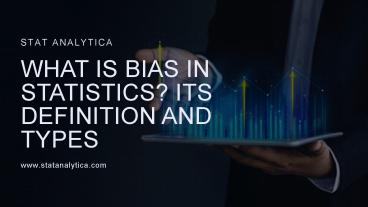What is bias in statistics its definition and types PowerPoint PPT Presentation
Title: What is bias in statistics its definition and types
1
(No Transcript)
2
What We Will Learn Today
Definition The most important statistical bias
types Selection bias Self-Selection bias Recall
bias Observer bias Survivorship bias Omitted
Variable Bias Cause-effect Bias Funding
Bias Conclusion
3
Bias in statistics is a term that is used to
refer to any type of error that we may find when
we use the statistical analyses. We can say that
it is an estimator of a parameter that may not be
confusing with its degree of precision. It is the
tendency of statistics, that is used to
overestimate or underestimate the parameter in
statistics. There are several reasons to raise
bias in statistics. One of the primary reasons
for this is the failure to respect either the
comparability or consistency. Let A be a
statistic used to estimate a parameter ?.
If E(A)? bias(?) then bias(?) is called the
bias of the statistic A, where E(A) represents
the expected value of the statistics A. If
bias(?)0, then E(A)?. So, A is an unbiased
estimator of the true parameter, say ?.
Overview
4
THE MOST IMPORTANT STATISTICAL BIAS TYPES
Here are the most important types of bias in
statistics. There are lots of bias in statistics.
It is quite tough to cover all the types of bias
in a single blog post. Therefore I am going to
share with you the top 8 types of bias in
statistics. These biases usually affect most of
your job as a data analyst and the data
scientist. If you want to be one of them, then
stay tuned with us. Lets explore the top 8 types
of bias in statistics.
5
TYPES OF BIAS
SELECTION BIAS
SURVIVORSHIP BIAS
SELF-SELECTION BIAS
OMITTED VARIABLE BIAS
RECALL BIAS
CAUSE-EFFECT BIAS
OBSERVER BIAS
FUNDING BIAS
6
When you are selecting the wrong set of data,
then the selection bias occurs. It can be done as
you are trying to get the sample from the subset
of your audience apart from the entire set of the
audience.In this way, the calculation you may
perform will not indicate or represent the whole
population data. There are plenty of other
reasons behind the selection bias, but the
primary reason for this is, collecting the data
from the easy to access source. Thus every time
the data may obtain from the wrong source.
7
Selection bias also has the subcategory, i.e.,
the self-selection bias. It is just like the
selection. In this, you may let the analyses
subject to select themselves. Suppose that in a
group of people, you allow people to choose
themselves based on some criteria. In the
self-selection bias, there is a possibility that
lazy people may not choose themselves or
considered themselves as part of the group.
Because it is based on a specific behavior.
8
This type of bias in statistics usually occurs in
interview or survey situations. As the name
suggests that it is based on the memory power of
the respondent. In the interview time, when the
responder doesnt remember everything correctly,
then this situation emerge the recall bias.It is
the typical scenario that we remember something,
and we forget something in quick sessions.
Beside, it is tough for us to remember all the
things we have seen, read, listen, or watched. It
is usual for us, but when we do the survey, then
it makes the survey an overwhelming process.
9
Observer bias is a pretty common bias. Because
most of the time, the researcher subconsciously
projecting his/her expectation from the research
that it will be going to happen with this
research. I mean to say that the researcher also
tells others about their projection in many
forms. For instance, influencing other
participants, making some serious conversation.
All these lead to observer bias.
10
When we need to perform the statistical operation
on the pre-selection process. In this type of
bias, the researcher focuses only on the specific
part of the data rather than the entire set of
data. It was also missing those data-points that
are not visible anymore and also fell off during
this process.
11
Sometimes we miss the most crucial element from
the model of our research. In this case, the
omitted variable bias occurs. This bias leads to
predictive analytics.
12
Cause-effect bias is one of the most critical
biases for decision-makers. But most of the
decision-makers are not aware of it. It is based
on the simple formula that correlation does not
imply causation.
13
The funding bias is also known as sponsorship
bias. When the scientific study results are
biased in favor of financial sponsor of the
research, then funding bias occurs.
14
Conclusion
There are a lot more types of bias in statistics.
But we have covered the most crucial one. Now it
might be clear in your mind that what is bias and
how it occurs in statistics.If you need any help
regrading the bias in statistics then you can get
into touch with our experts. They will solve all
your queries as soon as possible. Also get the
best excel homework help from the experts at
nominal charges.
15
Follow us on Social Media
16
(No Transcript)

